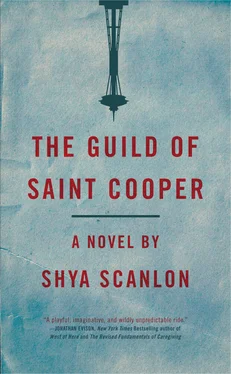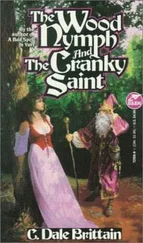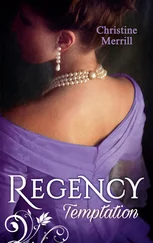But when he turned back to the crowd his face was serene. He held up a finger, smiled calmly, and said, “What would Cooper do?”
In the moment of silence that followed I could feel people quickly trying to change emotional course, until a low, unconvincing murmur responded with, “Rise above.”
ZZ Top was among the grumbling mass, and one look at him confirmed that he was not exactly ready, let alone able, to do the necessary rising. His body trembled with a mixture of excitement and anger and the desire to impose self-restraint. The holes in his shirt were like open sores oozing flesh. I could hear Russell speaking, but my fascination with his acolyte was distracting me and his words seemed far way, so that when the short man turned to look at me I felt I’d been caught somehow, and smiled dumbly, raising my hands in surrender. His expression, however, was not suspicion but curiosity, like he’d just seen me for the first time. People on all sides of me stepped back too, and I looked up, out, into the crowd, to see that everyone was staring at me. Another passageway had opened up, this time between me and the house, and Russell stood at its far end, holding out his arms as though to welcome me into an embrace.
“Blake,” he said, “aren’t you going to introduce yourself to the Guild?”
Clearly I had missed a critical point.
Nearly entranced, I began to walk down the cleared path, but not before ZZ Top, grinning savagely, grabbed me by the arm.
“Don’t forget the possibility of ruin,” he said, and then relaxed his grip.
“Gee,” I said. “Thanks.”
When I got up on the small stage Russell put his arm around my shoulder. Aya was now in such a state that she could not even bear to meet my eyes, and I decided to make it as quick as I could for her, to get her off stage and whatever help she required. Russell explained that I was the author of a book very dear to his heart, and that I’d volunteered to help him tell the story of Dale Cooper for the ages.
“I’m an honor to be here,” I said.
Realizing my error, I made a face. I had no idea what I should say, because I had no idea what these people knew. I would have to speak broadly, to refer simply to my enthusiasm and the road ahead, to speak of the future the way I remembered Harry Wilder speaking during the days of evacuation.
“Like Russell has said,” I began, “it’s going to be up to us to ensure that future generations have someone to inspire them along a virtuous, uh…”
I was beginning to doubt my ability to finish the thought. But just before turning back to Russell for assistance, I stumbled across a line I thought would work.
“The real inspiration on display today,” I said, “is behind me right now. It’s your hard work and creativity that I hope to use as my own example in the days to come. It’s your commitment that made this possible, and if I can only match that commitment in my own work, I know I’ll be on the right path. I know by working hard today, we’ll make Special Agent Dale Cooper a household name in the Seattle of tomorrow!”
The crowd looked a little afraid, it seemed to me. I wondered if I’d said something wrong, if I’d said too much, but Russell hollered loudly and began to clap, and slowly the crowd joined in, worried expressions morphing into acceptance, even joy, and before long there was such thunderous applause and whistling and shouts that my doubt was firmly overcome. I’d made the speech. I’d rallied. I’d done good.
I waved, shook Russell’s hand, waved again. Expecting to shake Aya’s hand, or even give her a hug, I was surprised to find that she was no longer on the platform, and I looked across the crowd for her. The applause was subsiding; people were beginning to splinter off and resume conversations they’d been in before the speech. Men were gathering up the fallen shroud; a three-piece band I hadn’t noticed before began to play bluegrass, and Tiger was tugging on a man’s pant leg, no doubt asking after his sexual orientation.
Scanning the crowd, my eyes passed over a figure standing across the street, standing beneath a large poplar, half hidden by shade, a figure whose entirely inappropriate formal dress caught my attention. It was only an instant — when I looked back he was gone — but it gave me a strange feeling, a chill. Had Russell hired someone to look the part, to play Dale Cooper? Or had some member of the so-called Guild of St. Cooper taken his enthusiasm, his belief in the cause, to an extreme? It could have been something else entirely, I realized — an accident of light. Whatever it was, it threw off my mood, and, like the graffiti, cast a momentary pall over my feeling of success.
“BS,” my mother said. “Total horse hockey.”
We were watching the news.
“How so?” I asked absently.
I was still high from the unexpected thrill of speaking at the birth house, still weirded out by the figure I’d seen. I was still wondering where Aya had gone, and why. In other words, I was only with my mother in fact. Not truly. And though I wasn’t entirely beyond my feelings of guilt, it felt good to have a secret. I tried to focus. The top story tonight — besides the lack of rain, which was now the Big Story in general — was that a farmer had been found in Georgia growing the last known heirloom tomato. My mother wasn’t having it.
“Well,” she said, “for one, we grow heirloom tomatoes in the garden. So, factually, it’s simply false.”
She paused to relight the joint she’d been nursing all night.
“But more than that, it’s just…it’s a silly thing to say. Heirloom varieties are all over the place. They’re what get left behind in places that aren’t taken over by big farms. An heirloom is just a non-hybrid variety that isn’t mass-produced or screwed with by, you know, whoever.”
“Mm-hmm.” I nodded sleepily. Since I hadn’t told my mother about my decision to help Russell in exchange for access to his operation, I couldn’t tell her about what had happened that afternoon. At least, I couldn’t tell her about my role in it. All she knew was that I’d gone to the unveiling.
“They have to be open-pollinated, too,” she said.
“Day ten,” I said, pointing at the screen. “No rain for ten days.”
“Heirlooms are really the final frontier.”
“How long do you think we can go without rain?”
My mother took another long drag.
“By splicing everything together,” she said, “we reduce the variety. And by reducing variety, we weaken our defenses to things like disease.”
I reached for the joint. “Tomorrow I’m going to shadow Zane on his delivery route.”
“Disease and climate.”
The heirloom farmer was now being interviewed. He didn’t seem to be a farmer, really. He was wearing a business suit, for one. He was holding a yellow tomato the size of a cantaloupe.
“According to the autopsy,” he said excitedly, “Abraham Lincoln ate tomatoes like this one the night he died.”
The camera zoomed in on the tomato until the entire screen was yellow.
“It’s beautiful,” said the newscaster.
The hand holding the tomato gave it a light squeeze.
“Spin that puppy for the people back home.”
ZANE’S TRUCK IDLED BEHIND him in the street. He’d never shown up in a truck before, or in a vehicle of any kind, and I assumed it was a result of Russell’s instruction to take me along on his route. If Zane was upset by my tagging along, his face didn’t give anything away. Nothing, that is, except the crash. For the first time, I noticed a Metro bus falling over the edge of his eyebrow toward his temple. It was nearly hidden in the tight mosaic of images on his skin, but now that I knew what to look for I could see it clearly. I wondered what other stories he’d had etched there. A turtle climbed over the edge of his jaw. A small child sat in the bowl of one sunken cheek.
Читать дальше












